Health and Social Care: Policies, Theories, and Responsibilities
VerifiedAdded on 2024/06/03
|20
|3134
|392
Report
AI Summary
This report provides a detailed analysis of health and social care practices, focusing on the implementation of policies, legislation, regulations, and codes of practice relevant to the field. It examines how local policies are developed in accordance with national policy requirements and evaluates the impact of these policies on organizational policy and practice. The report also explains the theories underpinning health and social care practice, analyzes the impact of social processes on service users, and evaluates the effectiveness of interprofessional working. Furthermore, it outlines professional responsibilities, accountabilities, and duties within a care home setting, assesses contributions to policy development, and suggests recommendations for improvement. The document highlights the importance of ethical practice, human rights, and person-centered care within health and social care organizations.
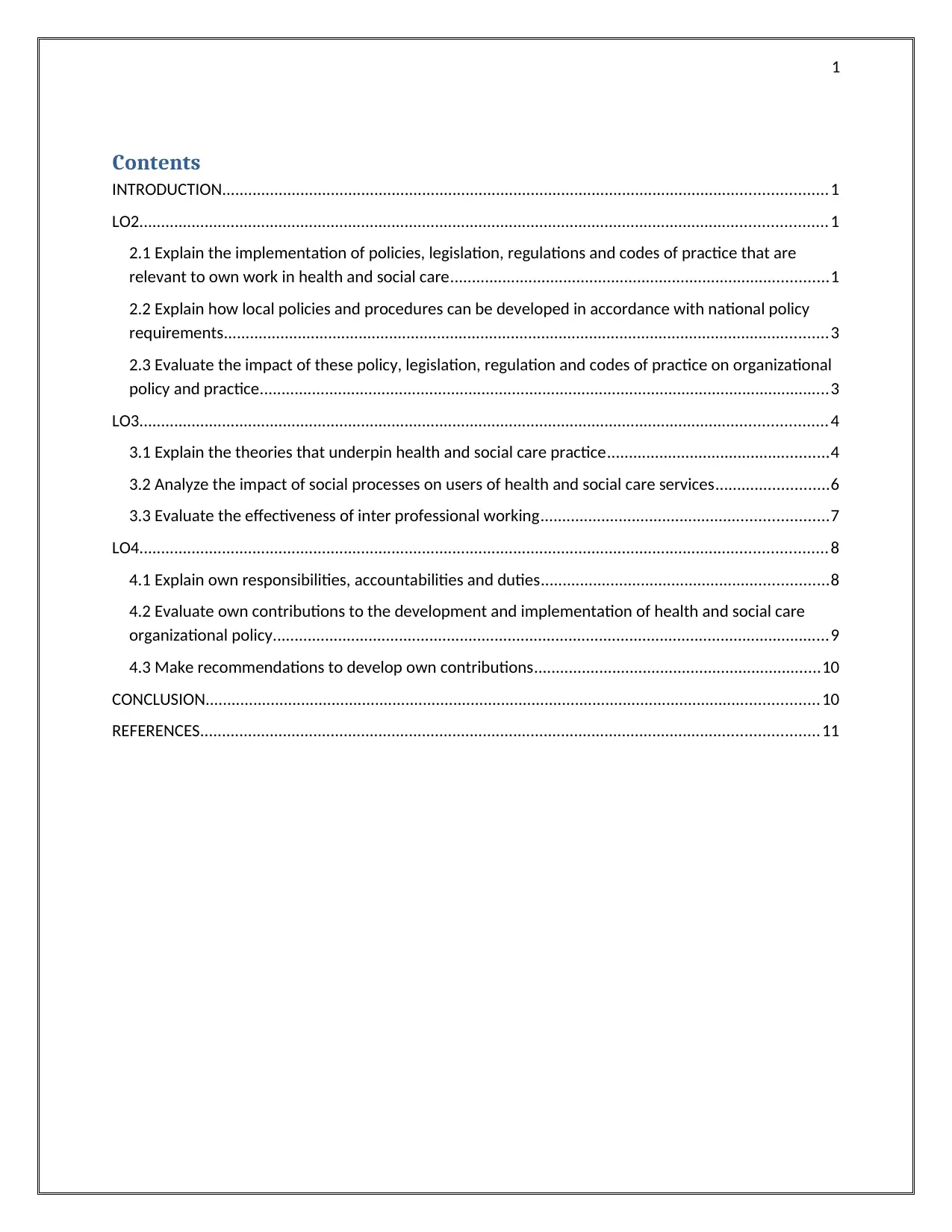
1
Contents
INTRODUCTION...........................................................................................................................................1
LO2..............................................................................................................................................................1
2.1 Explain the implementation of policies, legislation, regulations and codes of practice that are
relevant to own work in health and social care.......................................................................................1
2.2 Explain how local policies and procedures can be developed in accordance with national policy
requirements...........................................................................................................................................3
2.3 Evaluate the impact of these policy, legislation, regulation and codes of practice on organizational
policy and practice...................................................................................................................................3
LO3..............................................................................................................................................................4
3.1 Explain the theories that underpin health and social care practice...................................................4
3.2 Analyze the impact of social processes on users of health and social care services..........................6
3.3 Evaluate the effectiveness of inter professional working..................................................................7
LO4..............................................................................................................................................................8
4.1 Explain own responsibilities, accountabilities and duties..................................................................8
4.2 Evaluate own contributions to the development and implementation of health and social care
organizational policy................................................................................................................................9
4.3 Make recommendations to develop own contributions..................................................................10
CONCLUSION.............................................................................................................................................10
REFERENCES..............................................................................................................................................11
Contents
INTRODUCTION...........................................................................................................................................1
LO2..............................................................................................................................................................1
2.1 Explain the implementation of policies, legislation, regulations and codes of practice that are
relevant to own work in health and social care.......................................................................................1
2.2 Explain how local policies and procedures can be developed in accordance with national policy
requirements...........................................................................................................................................3
2.3 Evaluate the impact of these policy, legislation, regulation and codes of practice on organizational
policy and practice...................................................................................................................................3
LO3..............................................................................................................................................................4
3.1 Explain the theories that underpin health and social care practice...................................................4
3.2 Analyze the impact of social processes on users of health and social care services..........................6
3.3 Evaluate the effectiveness of inter professional working..................................................................7
LO4..............................................................................................................................................................8
4.1 Explain own responsibilities, accountabilities and duties..................................................................8
4.2 Evaluate own contributions to the development and implementation of health and social care
organizational policy................................................................................................................................9
4.3 Make recommendations to develop own contributions..................................................................10
CONCLUSION.............................................................................................................................................10
REFERENCES..............................................................................................................................................11
Paraphrase This Document
Need a fresh take? Get an instant paraphrase of this document with our AI Paraphraser
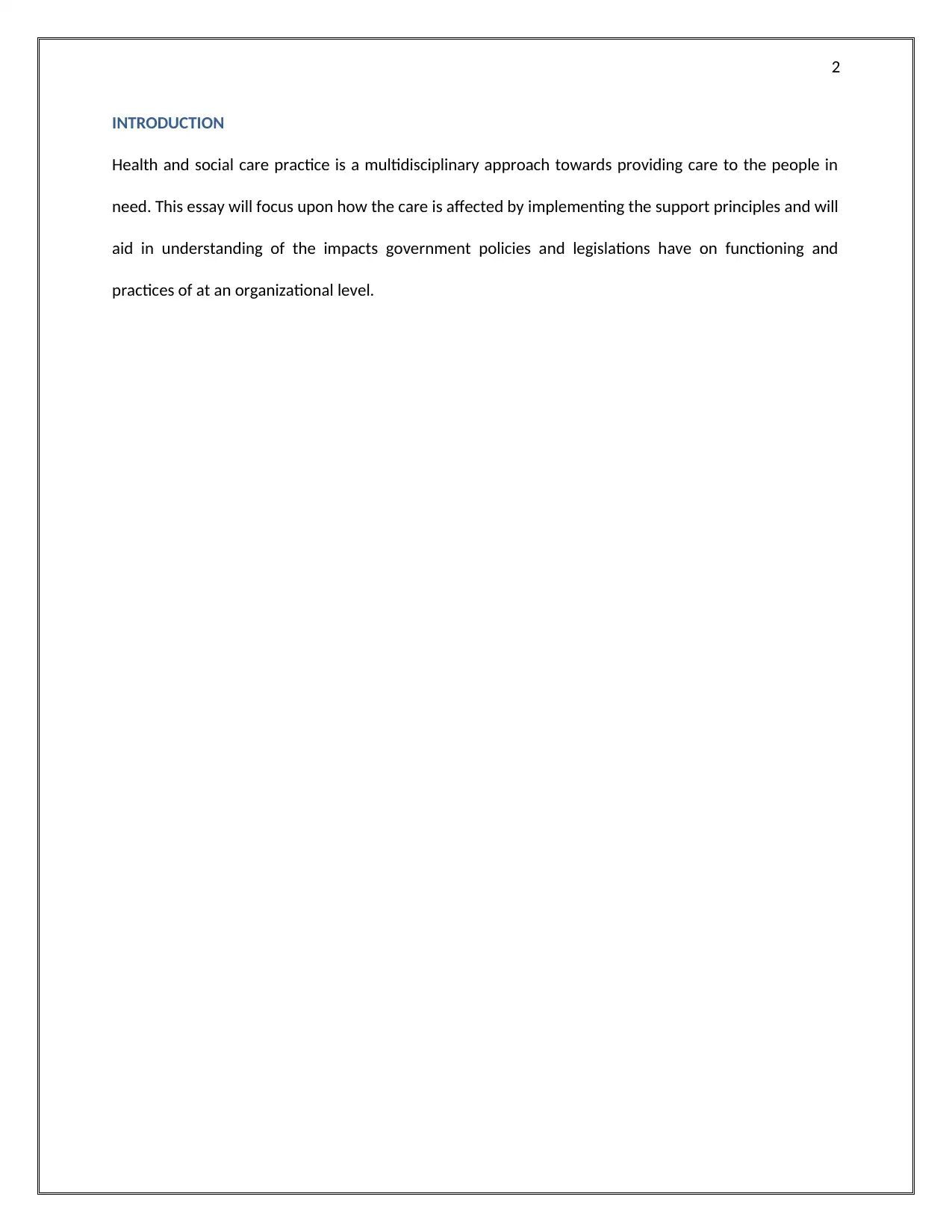
2
INTRODUCTION
Health and social care practice is a multidisciplinary approach towards providing care to the people in
need. This essay will focus upon how the care is affected by implementing the support principles and will
aid in understanding of the impacts government policies and legislations have on functioning and
practices of at an organizational level.
INTRODUCTION
Health and social care practice is a multidisciplinary approach towards providing care to the people in
need. This essay will focus upon how the care is affected by implementing the support principles and will
aid in understanding of the impacts government policies and legislations have on functioning and
practices of at an organizational level.
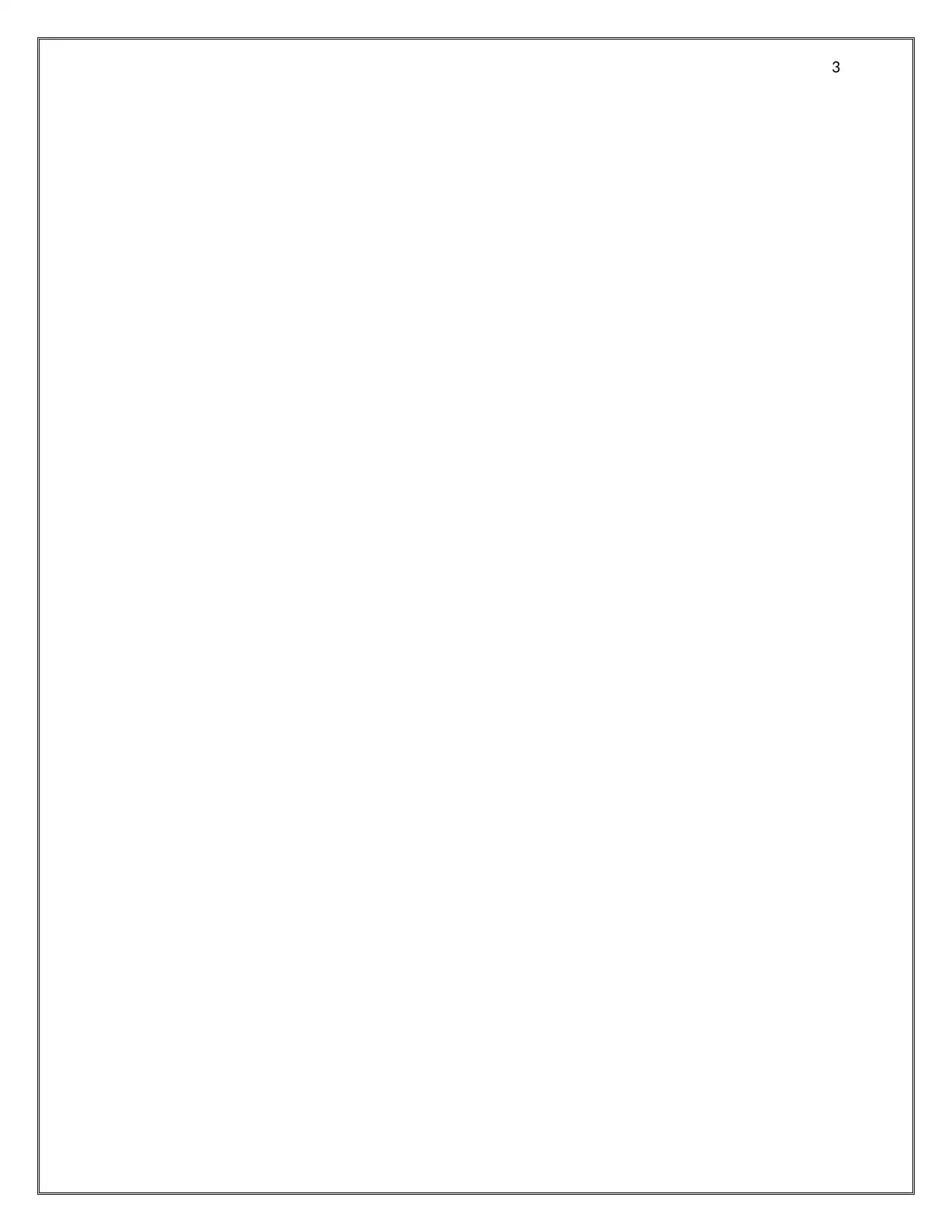
3
⊘ This is a preview!⊘
Do you want full access?
Subscribe today to unlock all pages.

Trusted by 1+ million students worldwide
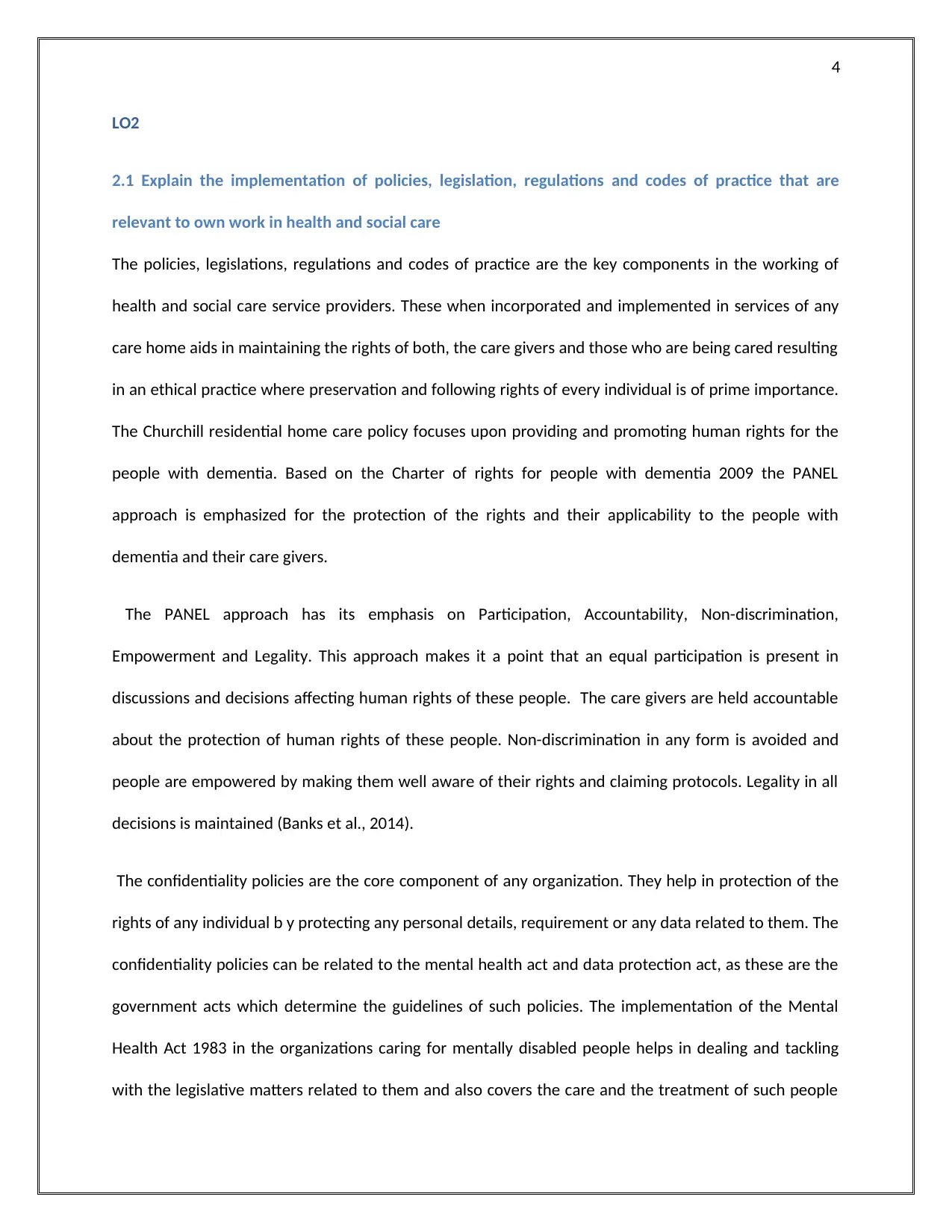
4
LO2
2.1 Explain the implementation of policies, legislation, regulations and codes of practice that are
relevant to own work in health and social care
The policies, legislations, regulations and codes of practice are the key components in the working of
health and social care service providers. These when incorporated and implemented in services of any
care home aids in maintaining the rights of both, the care givers and those who are being cared resulting
in an ethical practice where preservation and following rights of every individual is of prime importance.
The Churchill residential home care policy focuses upon providing and promoting human rights for the
people with dementia. Based on the Charter of rights for people with dementia 2009 the PANEL
approach is emphasized for the protection of the rights and their applicability to the people with
dementia and their care givers.
The PANEL approach has its emphasis on Participation, Accountability, Non-discrimination,
Empowerment and Legality. This approach makes it a point that an equal participation is present in
discussions and decisions affecting human rights of these people. The care givers are held accountable
about the protection of human rights of these people. Non-discrimination in any form is avoided and
people are empowered by making them well aware of their rights and claiming protocols. Legality in all
decisions is maintained (Banks et al., 2014).
The confidentiality policies are the core component of any organization. They help in protection of the
rights of any individual b y protecting any personal details, requirement or any data related to them. The
confidentiality policies can be related to the mental health act and data protection act, as these are the
government acts which determine the guidelines of such policies. The implementation of the Mental
Health Act 1983 in the organizations caring for mentally disabled people helps in dealing and tackling
with the legislative matters related to them and also covers the care and the treatment of such people
LO2
2.1 Explain the implementation of policies, legislation, regulations and codes of practice that are
relevant to own work in health and social care
The policies, legislations, regulations and codes of practice are the key components in the working of
health and social care service providers. These when incorporated and implemented in services of any
care home aids in maintaining the rights of both, the care givers and those who are being cared resulting
in an ethical practice where preservation and following rights of every individual is of prime importance.
The Churchill residential home care policy focuses upon providing and promoting human rights for the
people with dementia. Based on the Charter of rights for people with dementia 2009 the PANEL
approach is emphasized for the protection of the rights and their applicability to the people with
dementia and their care givers.
The PANEL approach has its emphasis on Participation, Accountability, Non-discrimination,
Empowerment and Legality. This approach makes it a point that an equal participation is present in
discussions and decisions affecting human rights of these people. The care givers are held accountable
about the protection of human rights of these people. Non-discrimination in any form is avoided and
people are empowered by making them well aware of their rights and claiming protocols. Legality in all
decisions is maintained (Banks et al., 2014).
The confidentiality policies are the core component of any organization. They help in protection of the
rights of any individual b y protecting any personal details, requirement or any data related to them. The
confidentiality policies can be related to the mental health act and data protection act, as these are the
government acts which determine the guidelines of such policies. The implementation of the Mental
Health Act 1983 in the organizations caring for mentally disabled people helps in dealing and tackling
with the legislative matters related to them and also covers the care and the treatment of such people
Paraphrase This Document
Need a fresh take? Get an instant paraphrase of this document with our AI Paraphraser
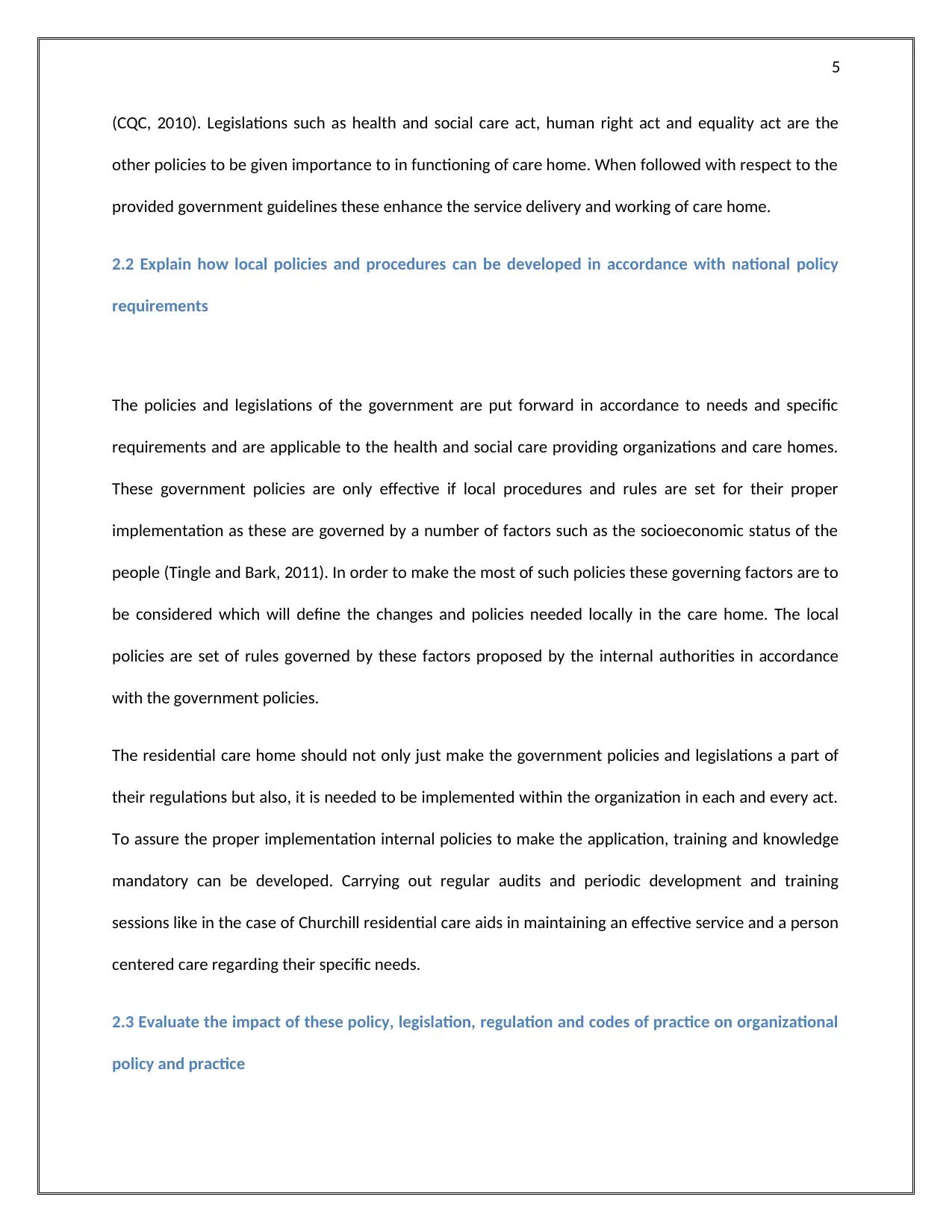
5
(CQC, 2010). Legislations such as health and social care act, human right act and equality act are the
other policies to be given importance to in functioning of care home. When followed with respect to the
provided government guidelines these enhance the service delivery and working of care home.
2.2 Explain how local policies and procedures can be developed in accordance with national policy
requirements
The policies and legislations of the government are put forward in accordance to needs and specific
requirements and are applicable to the health and social care providing organizations and care homes.
These government policies are only effective if local procedures and rules are set for their proper
implementation as these are governed by a number of factors such as the socioeconomic status of the
people (Tingle and Bark, 2011). In order to make the most of such policies these governing factors are to
be considered which will define the changes and policies needed locally in the care home. The local
policies are set of rules governed by these factors proposed by the internal authorities in accordance
with the government policies.
The residential care home should not only just make the government policies and legislations a part of
their regulations but also, it is needed to be implemented within the organization in each and every act.
To assure the proper implementation internal policies to make the application, training and knowledge
mandatory can be developed. Carrying out regular audits and periodic development and training
sessions like in the case of Churchill residential care aids in maintaining an effective service and a person
centered care regarding their specific needs.
2.3 Evaluate the impact of these policy, legislation, regulation and codes of practice on organizational
policy and practice
(CQC, 2010). Legislations such as health and social care act, human right act and equality act are the
other policies to be given importance to in functioning of care home. When followed with respect to the
provided government guidelines these enhance the service delivery and working of care home.
2.2 Explain how local policies and procedures can be developed in accordance with national policy
requirements
The policies and legislations of the government are put forward in accordance to needs and specific
requirements and are applicable to the health and social care providing organizations and care homes.
These government policies are only effective if local procedures and rules are set for their proper
implementation as these are governed by a number of factors such as the socioeconomic status of the
people (Tingle and Bark, 2011). In order to make the most of such policies these governing factors are to
be considered which will define the changes and policies needed locally in the care home. The local
policies are set of rules governed by these factors proposed by the internal authorities in accordance
with the government policies.
The residential care home should not only just make the government policies and legislations a part of
their regulations but also, it is needed to be implemented within the organization in each and every act.
To assure the proper implementation internal policies to make the application, training and knowledge
mandatory can be developed. Carrying out regular audits and periodic development and training
sessions like in the case of Churchill residential care aids in maintaining an effective service and a person
centered care regarding their specific needs.
2.3 Evaluate the impact of these policy, legislation, regulation and codes of practice on organizational
policy and practice
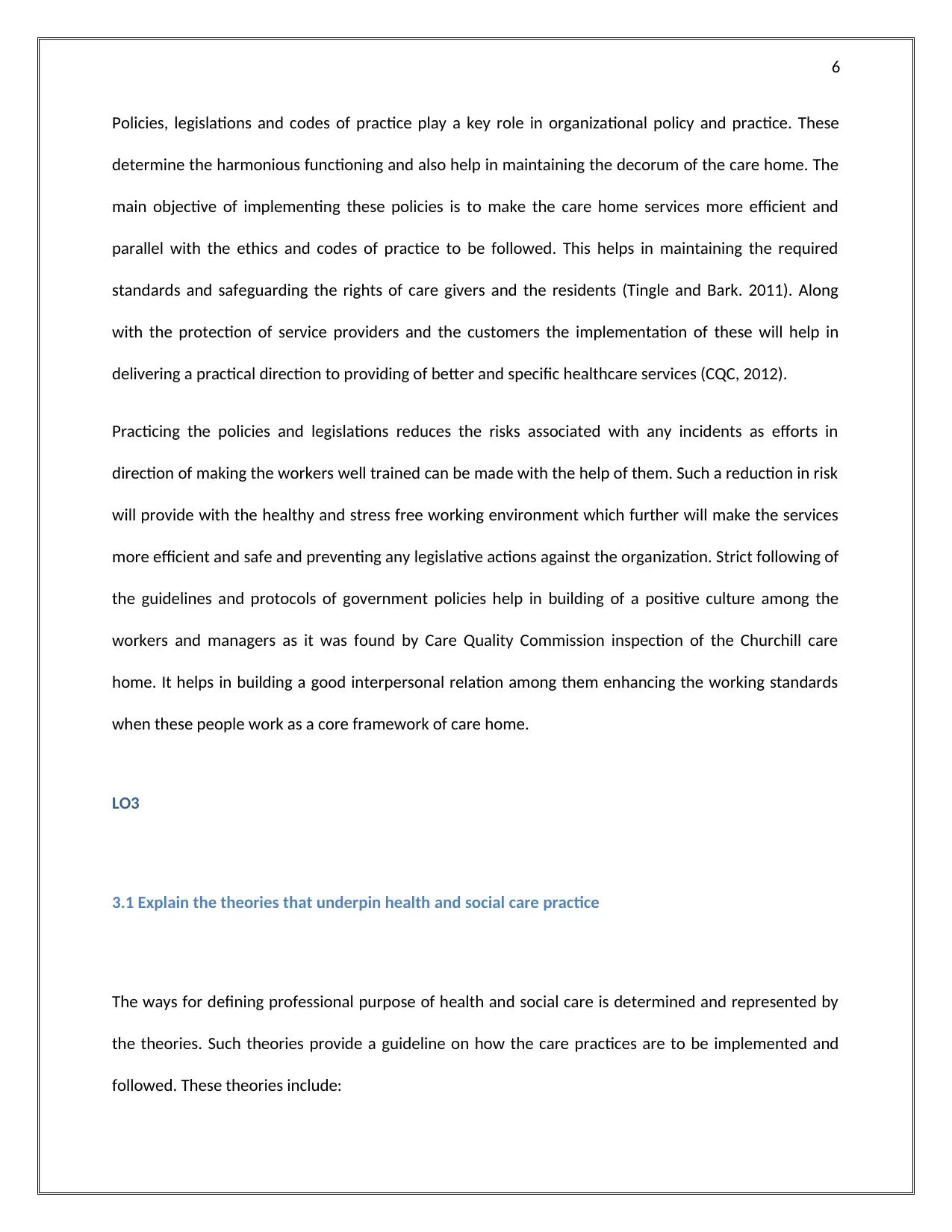
6
Policies, legislations and codes of practice play a key role in organizational policy and practice. These
determine the harmonious functioning and also help in maintaining the decorum of the care home. The
main objective of implementing these policies is to make the care home services more efficient and
parallel with the ethics and codes of practice to be followed. This helps in maintaining the required
standards and safeguarding the rights of care givers and the residents (Tingle and Bark. 2011). Along
with the protection of service providers and the customers the implementation of these will help in
delivering a practical direction to providing of better and specific healthcare services (CQC, 2012).
Practicing the policies and legislations reduces the risks associated with any incidents as efforts in
direction of making the workers well trained can be made with the help of them. Such a reduction in risk
will provide with the healthy and stress free working environment which further will make the services
more efficient and safe and preventing any legislative actions against the organization. Strict following of
the guidelines and protocols of government policies help in building of a positive culture among the
workers and managers as it was found by Care Quality Commission inspection of the Churchill care
home. It helps in building a good interpersonal relation among them enhancing the working standards
when these people work as a core framework of care home.
LO3
3.1 Explain the theories that underpin health and social care practice
The ways for defining professional purpose of health and social care is determined and represented by
the theories. Such theories provide a guideline on how the care practices are to be implemented and
followed. These theories include:
Policies, legislations and codes of practice play a key role in organizational policy and practice. These
determine the harmonious functioning and also help in maintaining the decorum of the care home. The
main objective of implementing these policies is to make the care home services more efficient and
parallel with the ethics and codes of practice to be followed. This helps in maintaining the required
standards and safeguarding the rights of care givers and the residents (Tingle and Bark. 2011). Along
with the protection of service providers and the customers the implementation of these will help in
delivering a practical direction to providing of better and specific healthcare services (CQC, 2012).
Practicing the policies and legislations reduces the risks associated with any incidents as efforts in
direction of making the workers well trained can be made with the help of them. Such a reduction in risk
will provide with the healthy and stress free working environment which further will make the services
more efficient and safe and preventing any legislative actions against the organization. Strict following of
the guidelines and protocols of government policies help in building of a positive culture among the
workers and managers as it was found by Care Quality Commission inspection of the Churchill care
home. It helps in building a good interpersonal relation among them enhancing the working standards
when these people work as a core framework of care home.
LO3
3.1 Explain the theories that underpin health and social care practice
The ways for defining professional purpose of health and social care is determined and represented by
the theories. Such theories provide a guideline on how the care practices are to be implemented and
followed. These theories include:
⊘ This is a preview!⊘
Do you want full access?
Subscribe today to unlock all pages.

Trusted by 1+ million students worldwide
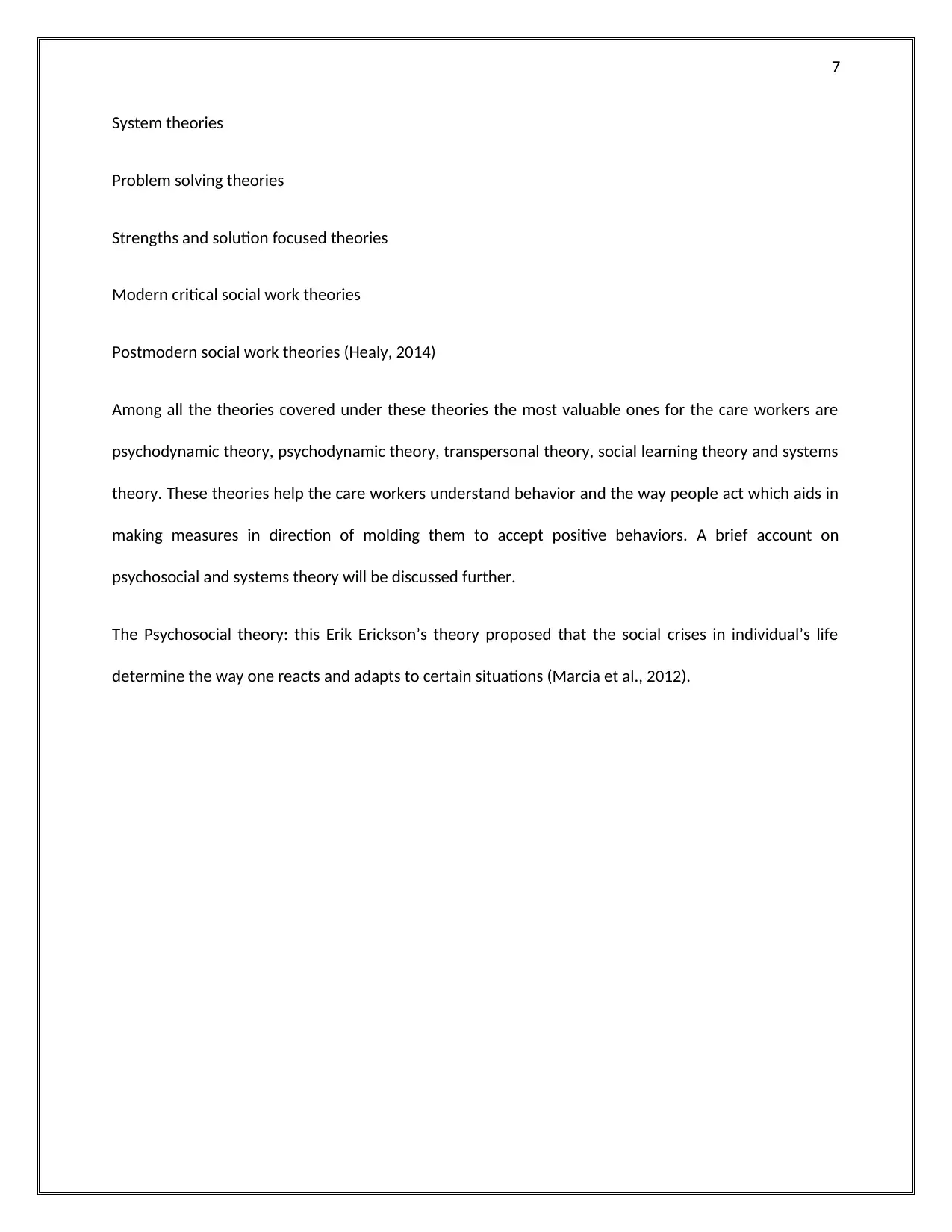
7
System theories
Problem solving theories
Strengths and solution focused theories
Modern critical social work theories
Postmodern social work theories (Healy, 2014)
Among all the theories covered under these theories the most valuable ones for the care workers are
psychodynamic theory, psychodynamic theory, transpersonal theory, social learning theory and systems
theory. These theories help the care workers understand behavior and the way people act which aids in
making measures in direction of molding them to accept positive behaviors. A brief account on
psychosocial and systems theory will be discussed further.
The Psychosocial theory: this Erik Erickson’s theory proposed that the social crises in individual’s life
determine the way one reacts and adapts to certain situations (Marcia et al., 2012).
System theories
Problem solving theories
Strengths and solution focused theories
Modern critical social work theories
Postmodern social work theories (Healy, 2014)
Among all the theories covered under these theories the most valuable ones for the care workers are
psychodynamic theory, psychodynamic theory, transpersonal theory, social learning theory and systems
theory. These theories help the care workers understand behavior and the way people act which aids in
making measures in direction of molding them to accept positive behaviors. A brief account on
psychosocial and systems theory will be discussed further.
The Psychosocial theory: this Erik Erickson’s theory proposed that the social crises in individual’s life
determine the way one reacts and adapts to certain situations (Marcia et al., 2012).
Paraphrase This Document
Need a fresh take? Get an instant paraphrase of this document with our AI Paraphraser
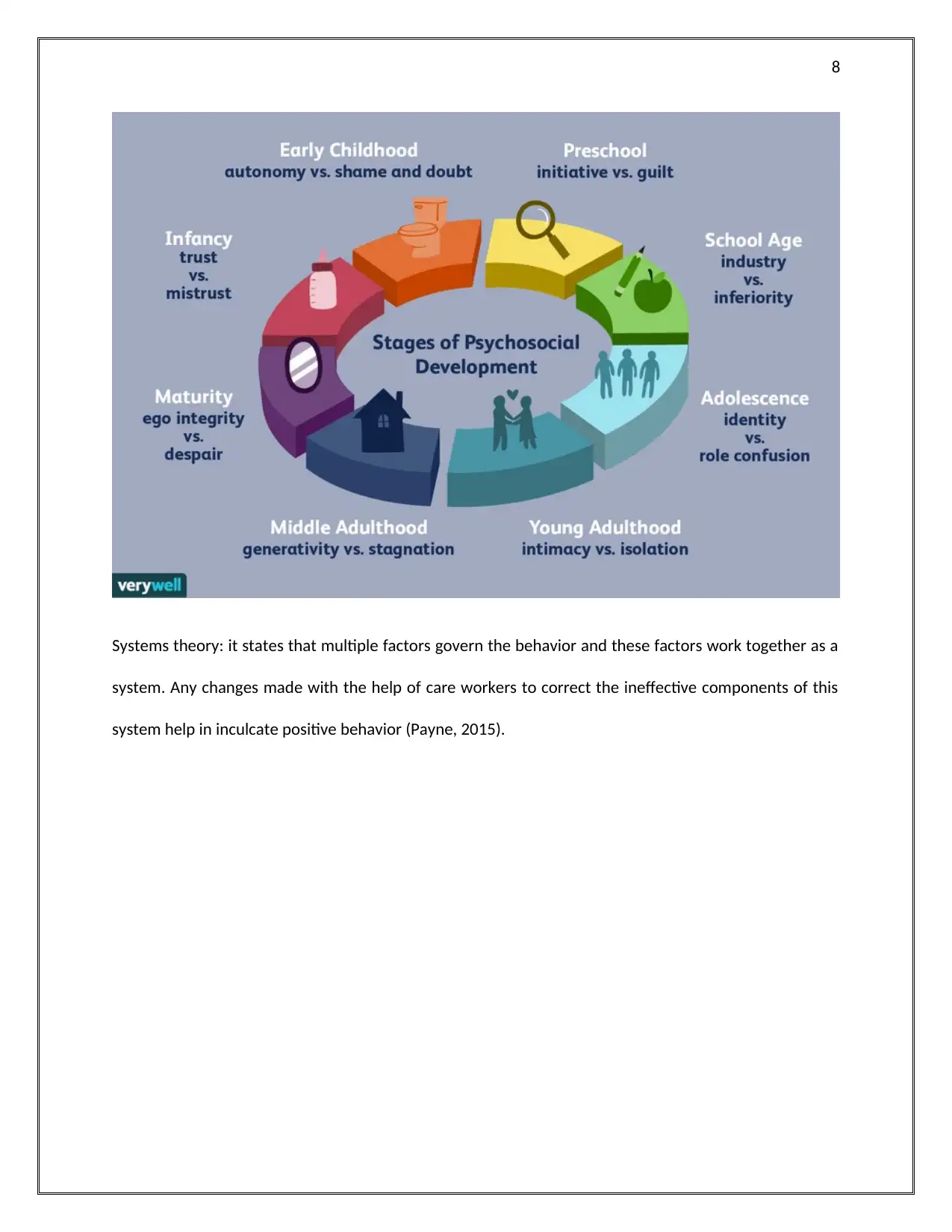
8
Systems theory: it states that multiple factors govern the behavior and these factors work together as a
system. Any changes made with the help of care workers to correct the ineffective components of this
system help in inculcate positive behavior (Payne, 2015).
Systems theory: it states that multiple factors govern the behavior and these factors work together as a
system. Any changes made with the help of care workers to correct the ineffective components of this
system help in inculcate positive behavior (Payne, 2015).
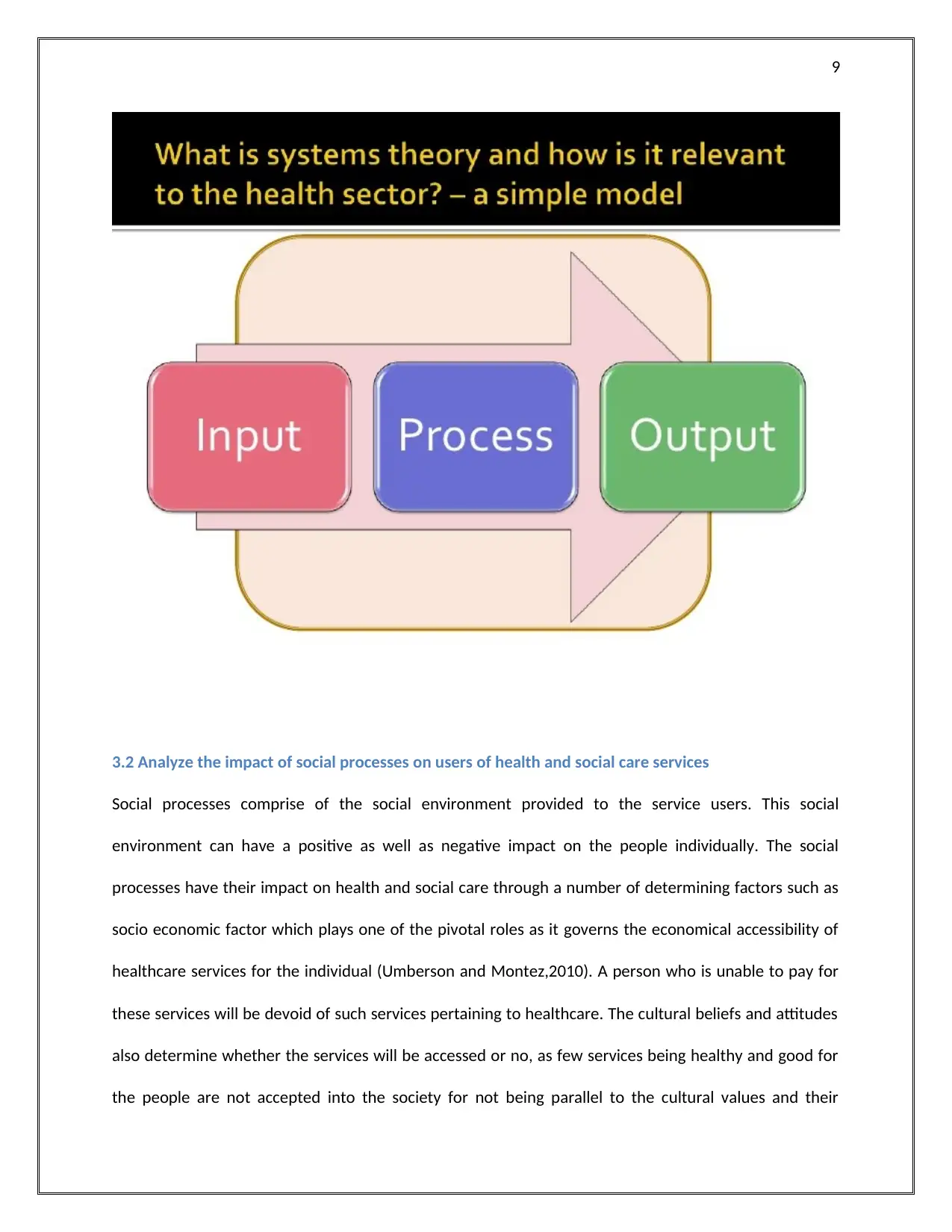
9
3.2 Analyze the impact of social processes on users of health and social care services
Social processes comprise of the social environment provided to the service users. This social
environment can have a positive as well as negative impact on the people individually. The social
processes have their impact on health and social care through a number of determining factors such as
socio economic factor which plays one of the pivotal roles as it governs the economical accessibility of
healthcare services for the individual (Umberson and Montez,2010). A person who is unable to pay for
these services will be devoid of such services pertaining to healthcare. The cultural beliefs and attitudes
also determine whether the services will be accessed or no, as few services being healthy and good for
the people are not accepted into the society for not being parallel to the cultural values and their
3.2 Analyze the impact of social processes on users of health and social care services
Social processes comprise of the social environment provided to the service users. This social
environment can have a positive as well as negative impact on the people individually. The social
processes have their impact on health and social care through a number of determining factors such as
socio economic factor which plays one of the pivotal roles as it governs the economical accessibility of
healthcare services for the individual (Umberson and Montez,2010). A person who is unable to pay for
these services will be devoid of such services pertaining to healthcare. The cultural beliefs and attitudes
also determine whether the services will be accessed or no, as few services being healthy and good for
the people are not accepted into the society for not being parallel to the cultural values and their
⊘ This is a preview!⊘
Do you want full access?
Subscribe today to unlock all pages.

Trusted by 1+ million students worldwide
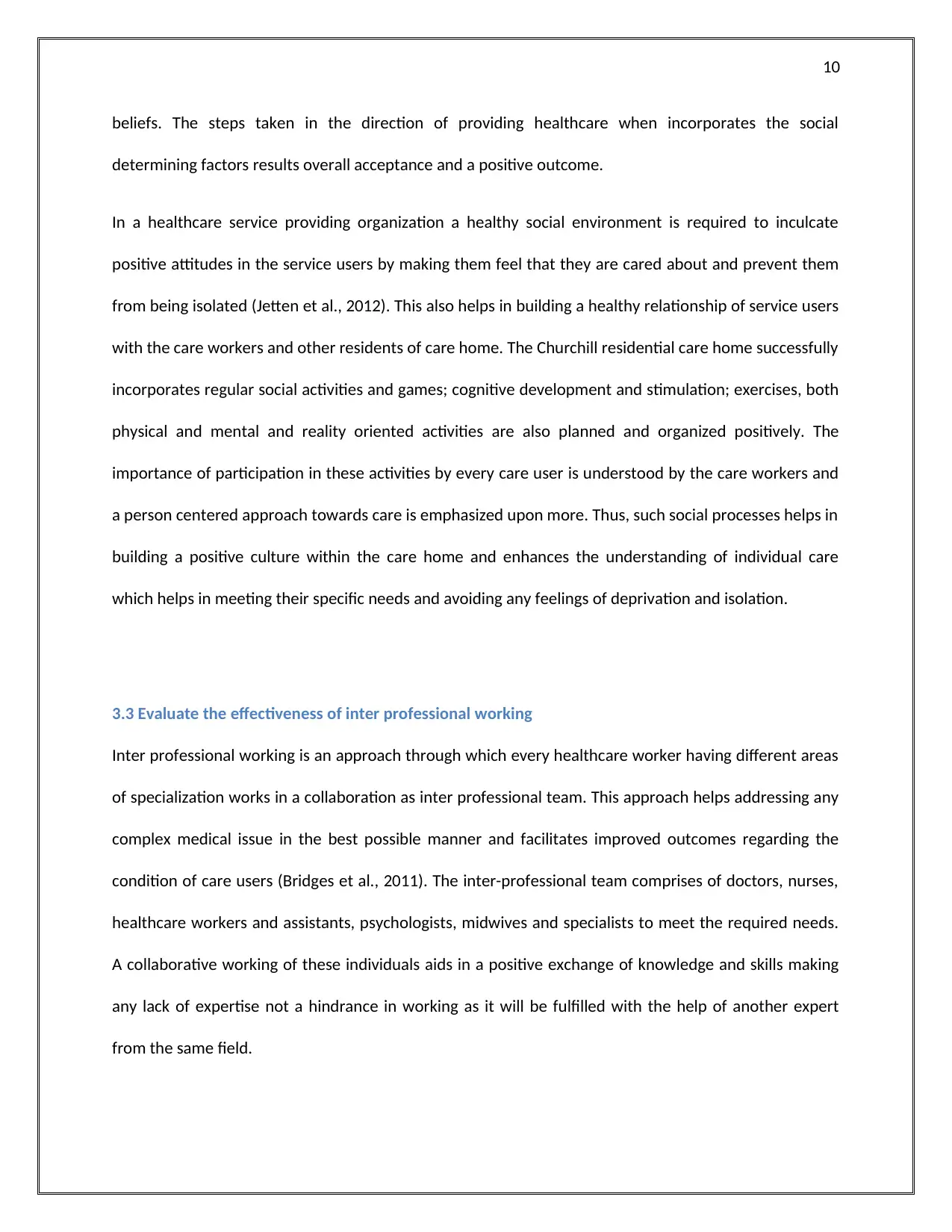
10
beliefs. The steps taken in the direction of providing healthcare when incorporates the social
determining factors results overall acceptance and a positive outcome.
In a healthcare service providing organization a healthy social environment is required to inculcate
positive attitudes in the service users by making them feel that they are cared about and prevent them
from being isolated (Jetten et al., 2012). This also helps in building a healthy relationship of service users
with the care workers and other residents of care home. The Churchill residential care home successfully
incorporates regular social activities and games; cognitive development and stimulation; exercises, both
physical and mental and reality oriented activities are also planned and organized positively. The
importance of participation in these activities by every care user is understood by the care workers and
a person centered approach towards care is emphasized upon more. Thus, such social processes helps in
building a positive culture within the care home and enhances the understanding of individual care
which helps in meeting their specific needs and avoiding any feelings of deprivation and isolation.
3.3 Evaluate the effectiveness of inter professional working
Inter professional working is an approach through which every healthcare worker having different areas
of specialization works in a collaboration as inter professional team. This approach helps addressing any
complex medical issue in the best possible manner and facilitates improved outcomes regarding the
condition of care users (Bridges et al., 2011). The inter-professional team comprises of doctors, nurses,
healthcare workers and assistants, psychologists, midwives and specialists to meet the required needs.
A collaborative working of these individuals aids in a positive exchange of knowledge and skills making
any lack of expertise not a hindrance in working as it will be fulfilled with the help of another expert
from the same field.
beliefs. The steps taken in the direction of providing healthcare when incorporates the social
determining factors results overall acceptance and a positive outcome.
In a healthcare service providing organization a healthy social environment is required to inculcate
positive attitudes in the service users by making them feel that they are cared about and prevent them
from being isolated (Jetten et al., 2012). This also helps in building a healthy relationship of service users
with the care workers and other residents of care home. The Churchill residential care home successfully
incorporates regular social activities and games; cognitive development and stimulation; exercises, both
physical and mental and reality oriented activities are also planned and organized positively. The
importance of participation in these activities by every care user is understood by the care workers and
a person centered approach towards care is emphasized upon more. Thus, such social processes helps in
building a positive culture within the care home and enhances the understanding of individual care
which helps in meeting their specific needs and avoiding any feelings of deprivation and isolation.
3.3 Evaluate the effectiveness of inter professional working
Inter professional working is an approach through which every healthcare worker having different areas
of specialization works in a collaboration as inter professional team. This approach helps addressing any
complex medical issue in the best possible manner and facilitates improved outcomes regarding the
condition of care users (Bridges et al., 2011). The inter-professional team comprises of doctors, nurses,
healthcare workers and assistants, psychologists, midwives and specialists to meet the required needs.
A collaborative working of these individuals aids in a positive exchange of knowledge and skills making
any lack of expertise not a hindrance in working as it will be fulfilled with the help of another expert
from the same field.
Paraphrase This Document
Need a fresh take? Get an instant paraphrase of this document with our AI Paraphraser
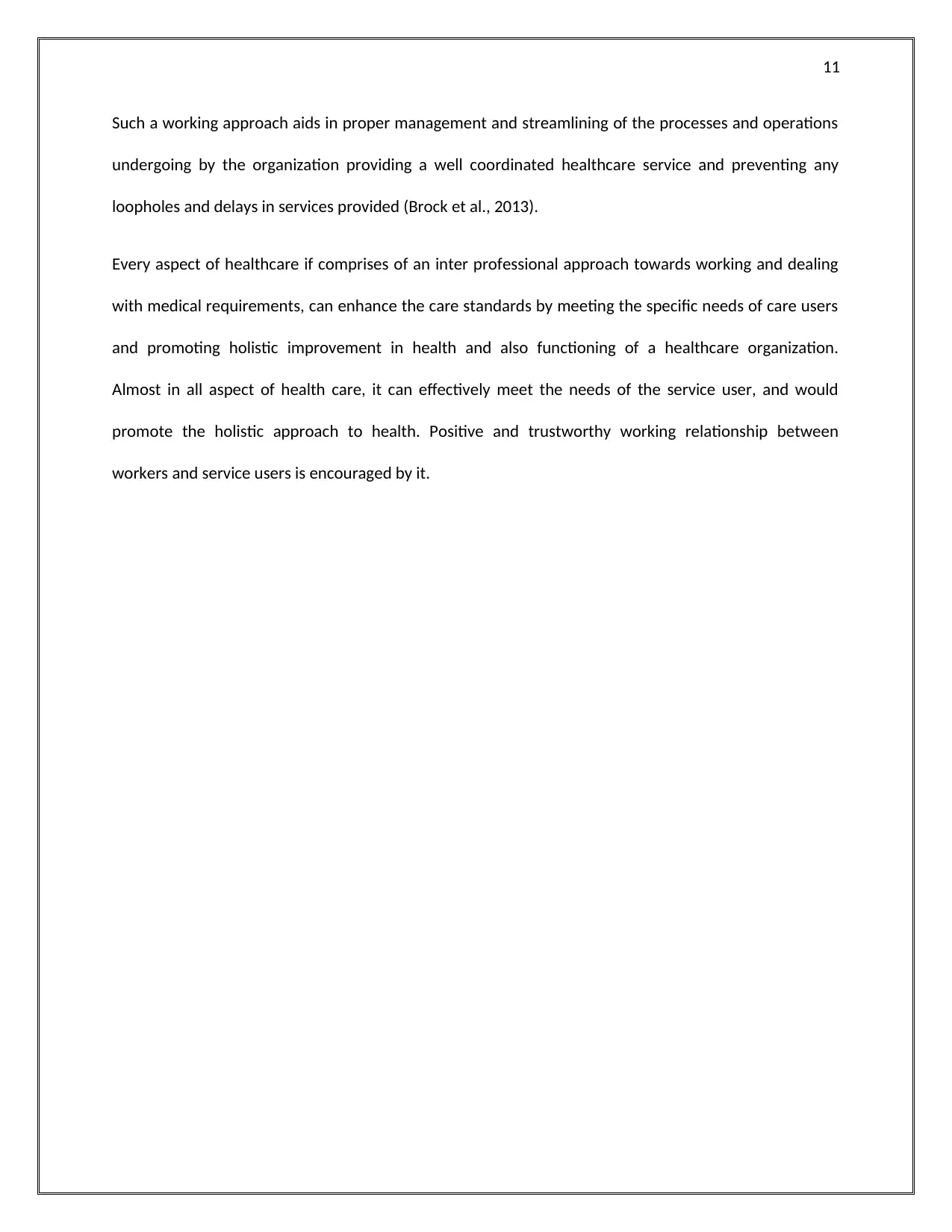
11
Such a working approach aids in proper management and streamlining of the processes and operations
undergoing by the organization providing a well coordinated healthcare service and preventing any
loopholes and delays in services provided (Brock et al., 2013).
Every aspect of healthcare if comprises of an inter professional approach towards working and dealing
with medical requirements, can enhance the care standards by meeting the specific needs of care users
and promoting holistic improvement in health and also functioning of a healthcare organization.
Almost in all aspect of health care, it can effectively meet the needs of the service user, and would
promote the holistic approach to health. Positive and trustworthy working relationship between
workers and service users is encouraged by it.
Such a working approach aids in proper management and streamlining of the processes and operations
undergoing by the organization providing a well coordinated healthcare service and preventing any
loopholes and delays in services provided (Brock et al., 2013).
Every aspect of healthcare if comprises of an inter professional approach towards working and dealing
with medical requirements, can enhance the care standards by meeting the specific needs of care users
and promoting holistic improvement in health and also functioning of a healthcare organization.
Almost in all aspect of health care, it can effectively meet the needs of the service user, and would
promote the holistic approach to health. Positive and trustworthy working relationship between
workers and service users is encouraged by it.
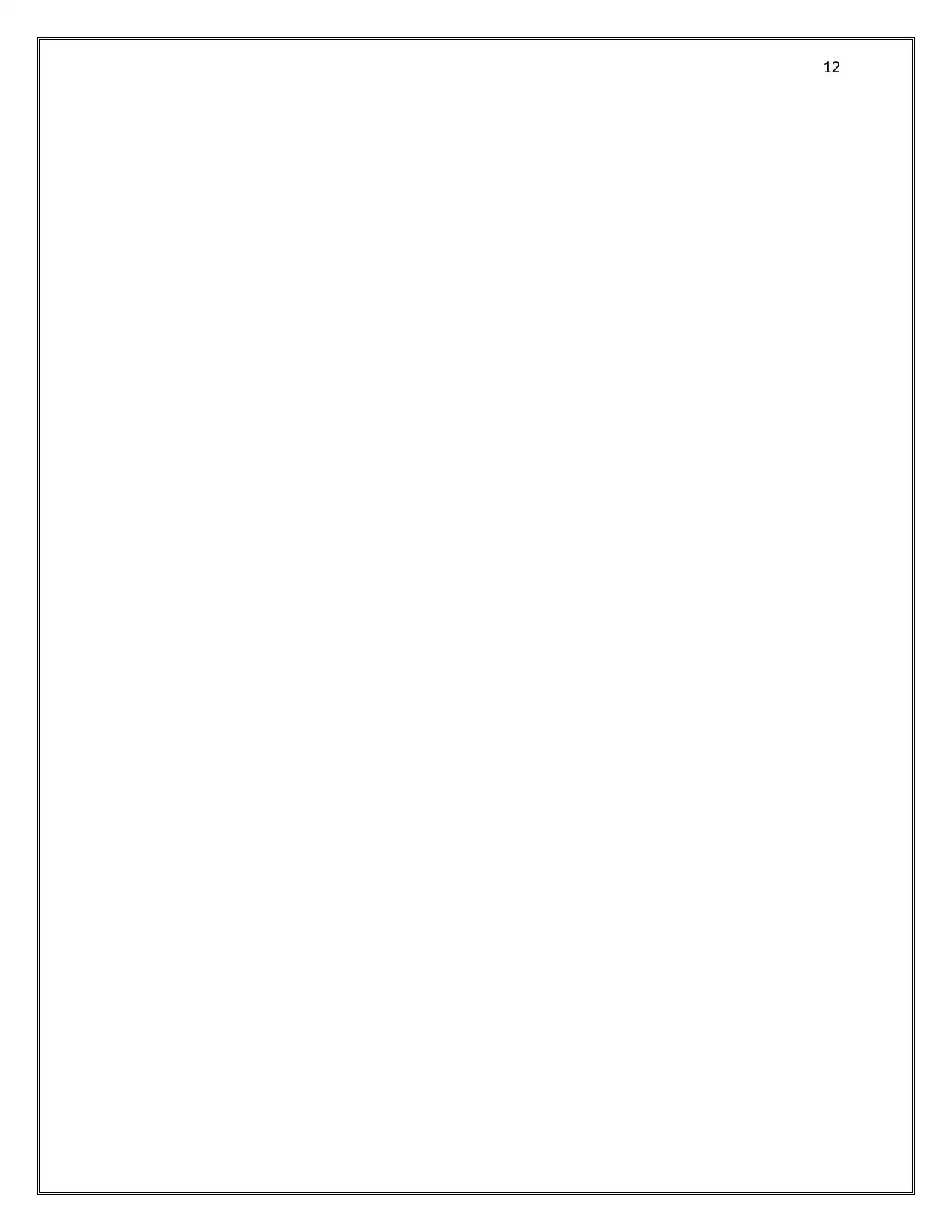
12
⊘ This is a preview!⊘
Do you want full access?
Subscribe today to unlock all pages.

Trusted by 1+ million students worldwide
1 out of 20
Related Documents
Your All-in-One AI-Powered Toolkit for Academic Success.
+13062052269
info@desklib.com
Available 24*7 on WhatsApp / Email
![[object Object]](/_next/static/media/star-bottom.7253800d.svg)
Unlock your academic potential
Copyright © 2020–2026 A2Z Services. All Rights Reserved. Developed and managed by ZUCOL.





